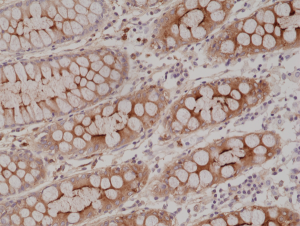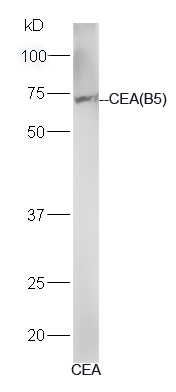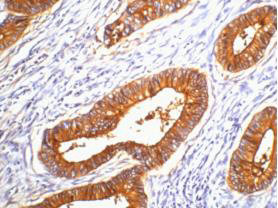
Immunohistochemical staining of formalin fixed and paraffin embedded human colon tissue section using anti-CEA rabbit monoclonal antibody (Clone RM326) at a 1:2000 dilution.
anti-CEA (human), Rabbit Monoclonal (RM326)
REV-31-1213-00
ApplicationsWestern Blot, ELISA, ImmunoHistoChemistry
Product group Antibodies
ReactivityHuman
TargetCEACAM5
Overview
- SupplierRevMAb Biosciences
- Product Nameanti-CEA (human), Rabbit Monoclonal (RM326)
- Delivery Days Customer2
- ApplicationsWestern Blot, ELISA, ImmunoHistoChemistry
- CertificationResearch Use Only
- ClonalityMonoclonal
- Clone IDRM326
- Gene ID1048
- Target nameCEACAM5
- Target descriptionCEA cell adhesion molecule 5
- Target synonymsCD66e, CEA, cell adhesion molecule CEACAM5, carcinoembryonic antigen related cell adhesion molecule 5, meconium antigen 100
- HostRabbit
- IsotypeIgG
- Protein IDP06731
- Protein NameCell adhesion molecule CEACAM5
- Scientific DescriptionCEA (Carcino Embryonic Antigen; CD66e) is synthesized during development in the fetal gut and re-expressed in increased amounts in intestinal carcinomas and several other tumors. CEA is a member of carcinoembryonic antigens, immunoglobulin supergene family and consists of a single N domain (structural homology to the immunoglobulin variable) and six immunoglobulin constant-like A (A1, A2, A3) and B domains (B1, B2, B3). Antibodies to CEA are useful in identifying the origin of various metastatic adenocarcinomas and in distinguishing pulmonary adenocarcinomas (60 to 70% are CEA+) from pleural mesotheliomas (rarely or weakly CEA+). CEA mediates cell adhesion via homophilic as well as heterophilic binding to other proteins of the subgroup. Multiple cellular activities have been attributed to CEA, including roles in the differentiation and arrangement of tissue three-dimensional structure, angiogenesis, apoptosis, tumor suppression, metastasis and the modulation of innate and adaptive immune responses. - Recombinant Antibody. This antibody reacts to human CEA (Carcinoembryonic Antigen) (CD66e). Applications: WB, IHC, ELISA. Source: Rabbit. Liquid. 50% Glycerol/PBS with 1% BSA and 0.09% sodium azide. CEA (Carcino Embryonic Antigen; CD66e) is synthesized during development in the fetal gut and re-expressed in increased amounts in intestinal carcinomas and several other tumors. CEA is a member of carcinoembryonic antigens, immunoglobulin supergene family and consists of a single N domain (structural homology to the immunoglobulin variable) and six immunoglobulin constant-like A (A1, A2, A3) and B domains (B1, B2, B3). Antibodies to CEA are useful in identifying the origin of various metastatic adenocarcinomas and in distinguishing pulmonary adenocarcinomas (60 to 70% are CEA+) from pleural mesotheliomas (rarely or weakly CEA+). CEA mediates cell adhesion via homophilic as well as heterophilic binding to other proteins of the subgroup. Multiple cellular activities have been attributed to CEA, including roles in the differentiation and arrangement of tissue three-dimensional structure, angiogenesis, apoptosis, tumor suppression, metastasis and the modulation of innate and adaptive immune responses.
- ReactivityHuman
- Storage Instruction-20°C,2°C to 8°C
- UNSPSC41116161








